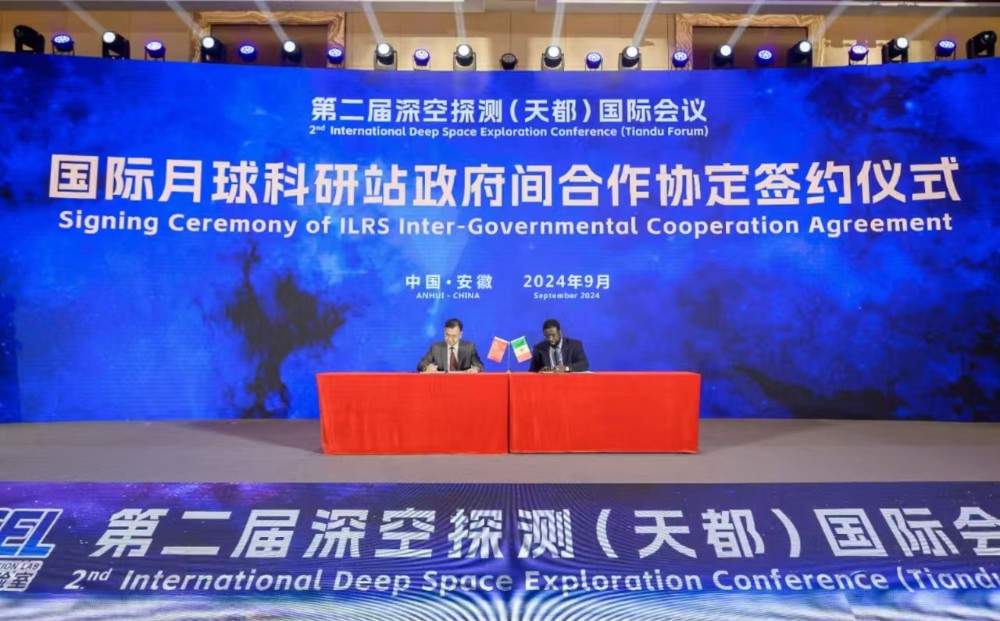Products You May Like
HELSINKI — Senegal’s space agency signed an agreement on cooperation on the International Lunar Research Station Thursday, swelling the ranks of the China-led project.
Maram Kaire, head of the Senegalese Space Study Agency (ASES) and Li Guoping, chief engineer of the China National Space Administration (CNSA) signed the agreement on cooperation in the International Lunar Research Station (ILRS) at the second international conference on deep space exploration (Tiandu) in Tunxi, Anhui province, Sept. 5.
The agreement came as Chinese President Xi Jinping held talks with Senegalese President Bassirou Diomaye Faye. The latter is visiting for the Beijing Summit of the Forum on China-Africa Cooperation (FOCAC) and a state visit.
China aims to build a basic robotic ILRS by 2035, with five launches to establish power, communications and other infrastructure. An extended station capable of long-term human habitation is planned for 2045.
Senegal joins Russia, Venezuela, Belarus, Pakistan, Azerbaijan, South Africa, Egypt, Nicaragua, Thailand, Serbia and Kazakhstan as national-level ILRS participants.
Senegal has a modest space industry but is focusing on satellite technology. Its first satellite, the Gaindesat-1A nanosat, launched on a Falcon 9 rocket Aug. 16 from Vandenberg Space Force Base. It was developed in partnership with University Space Centre of Montpellier (CSUM). The West African nation is also developing international partnerships and educational initiatives.
New subnational and international partners
The China-led ILRS also added a number of subnational entities and firms to its list of partners at the Tiandu conference. Institutions from the United Arab Emirates (Orbital Space), Serbia Astronomical Observatory Belgrade), Switzerland (Spacetalk SA), Indonesia (University of Bandar Lampung), Pakistan (National University of Sciences & Technology), Panama (Space Science Innovation Center of Panama) and South Africa (South African Radio Astronomy Observatory (SARAO)) signed memoranda of understanding on ILRS with the Deep Space Exploration Lab (DSEL) at the conference.
International institutions, the Belt and Road Alliance for Science and Technology, the Foundation for Space Development Africa, and Africa Business Alliance also inked agreements.
The new partners reflect an established trend of China attracting participants from the Global South, and engaging in subnational diplomacy. This somewhat mirroring the country’s wider diplomatic moves.
“So far, more than 10 countries (international organizations) and more than 40 international institutions have signed international cooperation documents with relevant Chinese parties,” DSEL said in a statement.
Furthermore, DSEL stated that “leaders of space agencies from six countries, including China, Laos, Turkey, Venezuela, Senegal, and Cuba, held an open roundtable forum on international cooperation for the International Lunar Research Station’s large-scale scientific project.” Turkey has earlier been reported to have applied to join the ILRS.
China has stated it aims to attract 50 countries to the ILRS project. This likely includes subnational participation, rather than counting strictly national and space agency-level cooperation. It plans to establish an organization to coordinate the ILRS project.
China will launch precursor ILRS missions in the 2020s. These include Chang’e-7 around 2026 and Chang’e-8 around 2028. The latter mission will include in-situ resource utilization technology tests. Both multi-spacecraft missions will target the lunar south pole.
